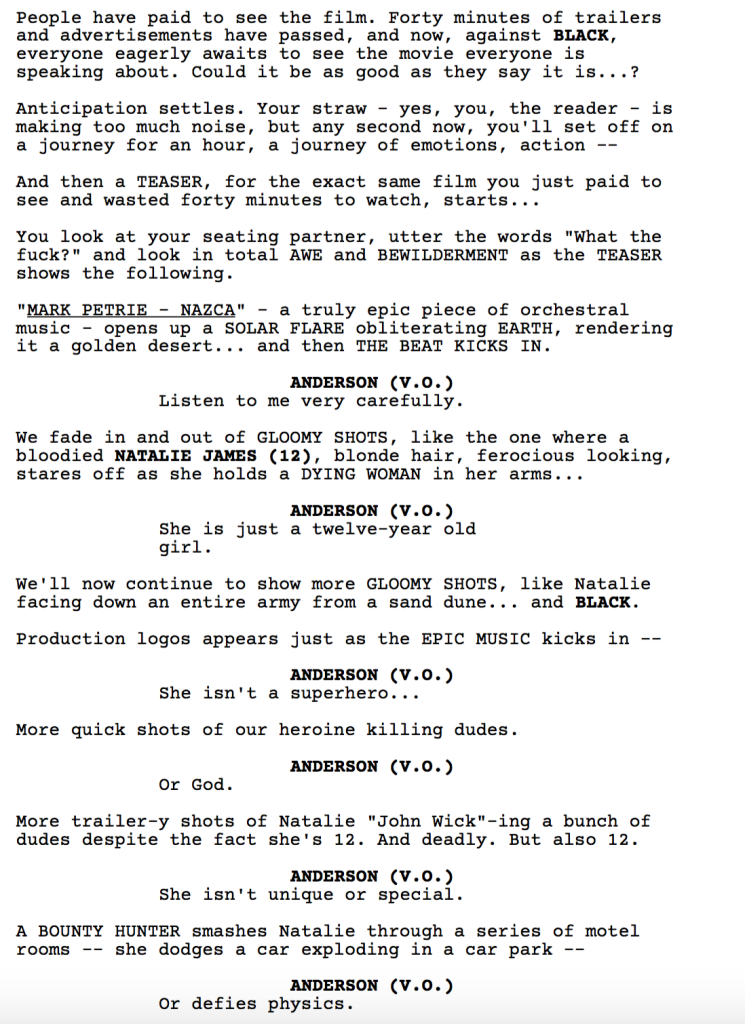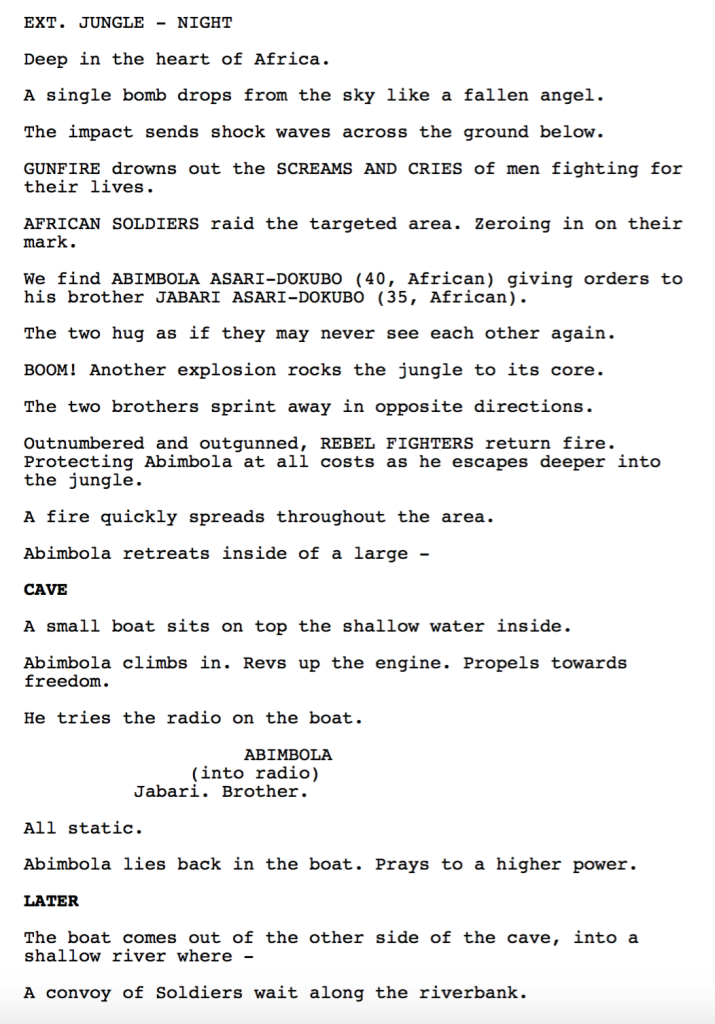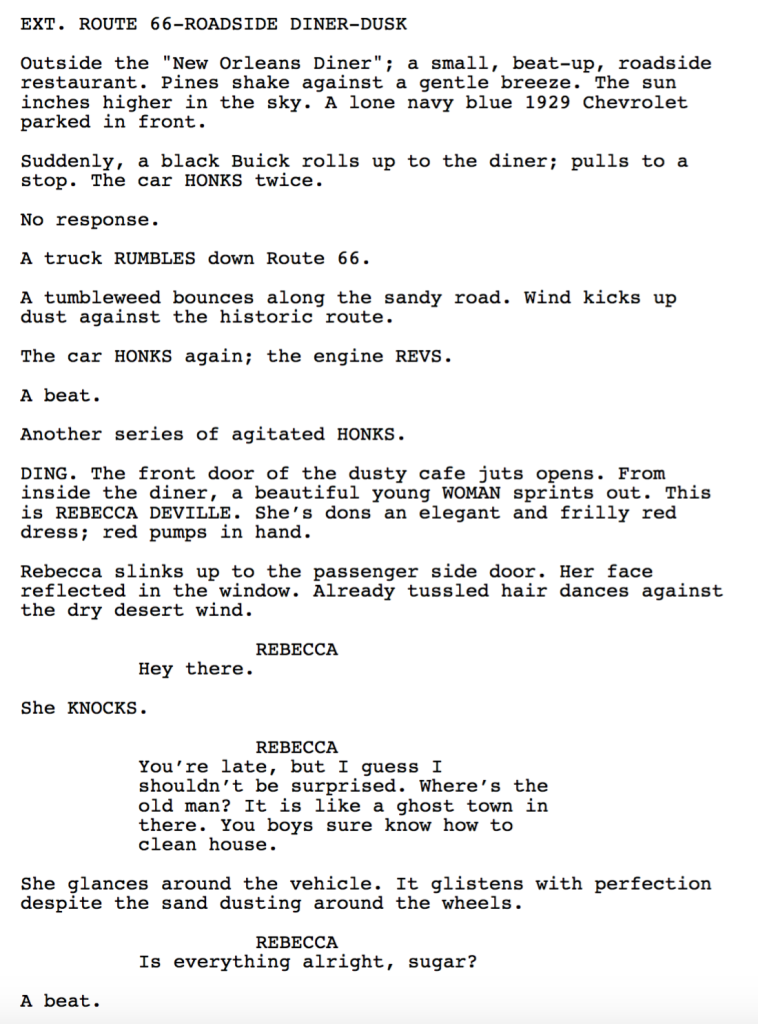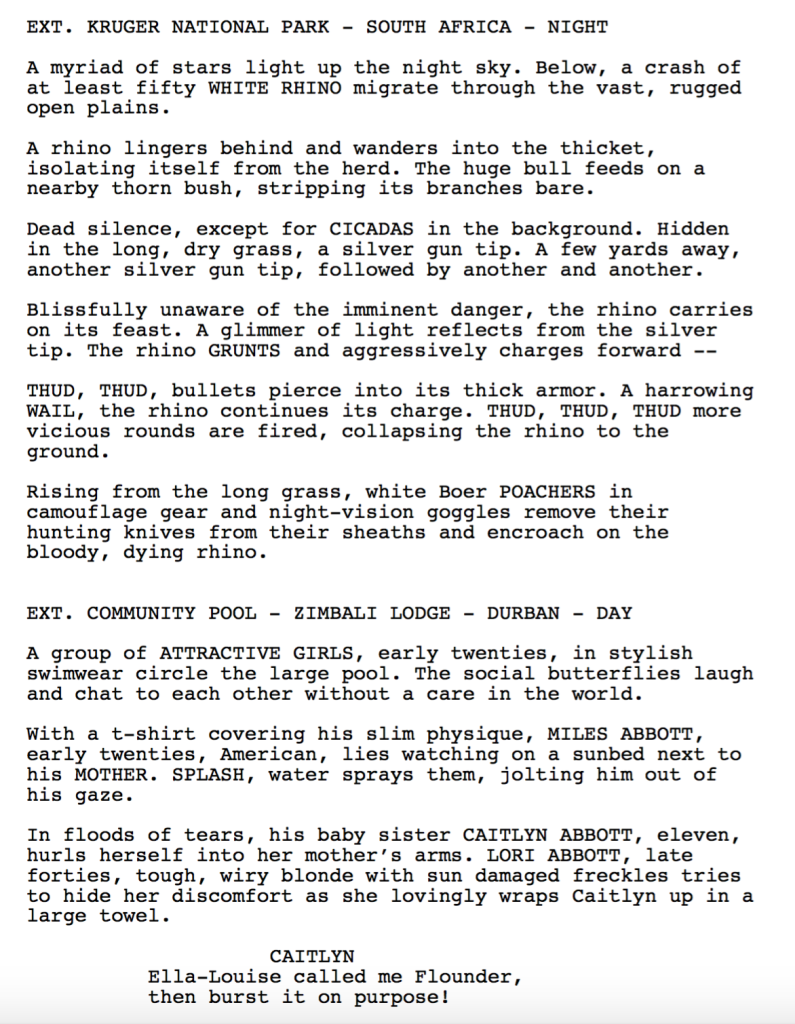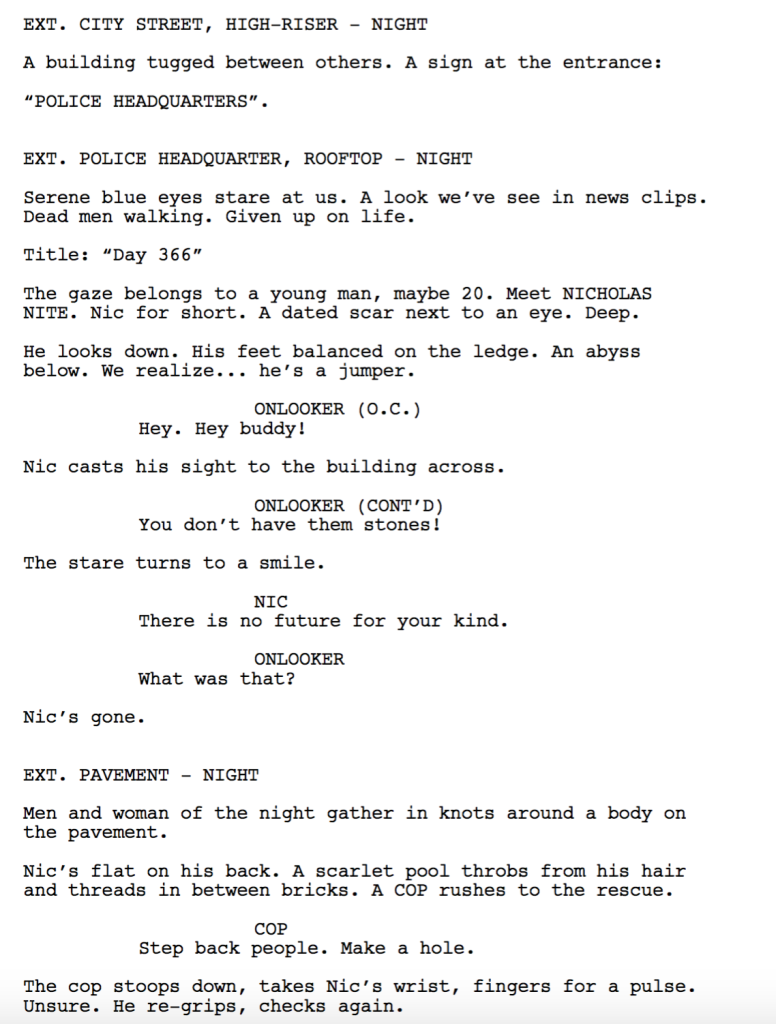Genre: Biopic
Premise: The story of how Elon Musk juggled two of the riskiest business ventures in history, creating a direct-to-consumer electric car and building a privatized space exploration company.
About: This script finished with 10 votes on last year’s Black List. The writer, Jordan Barel, is new to the game. He doesn’t have any produced credits yet, but he has worked in the business as an assistant to celebrated comedy actor Paul Scheer.
Writer: Jordan Barel
Details: 120 pages

You.
Can’t.
Stop.
The biopic.
Can’t stop it folks. Don’t even try to stop it with your anti-biopic kill spray. Like cockroaches, biopics are immune to serial biopic killers. Yesterday I gave you the best genre to write in to get your movie made (the Contained Thriller). Today I’m giving you the best genre to write in to get noticed (the Biopic).
There is no genre the industry is more forgiving of than the biopic. You could literally copy and paste a Wikipedia page and sprinkle a few pages of dialogue in and have a shot at making the Black List. Okay, maybe that’s an exaggeration. But it’s not THAT big of an exaggeration.
For this reason, I only read biopics to torture myself. But I’ve picked The Man From Tomorrow for a specific reason.
Because Elon Musk is crazy!
Musk ROUTINELY makes promises he doesn’t keep – such as saying a few years ago that he’d have a colony on Mars by now. He’s made TWO DEADLINE PROMISES with the new Tesla Model 3 that he’s missed. And it’s not even close. There’s no clear date on when the car will arrive. Oh, and he thinks we’re living in The Matrix AND in danger of being killed off by A.I. No, I’m serious. He really does. Google it. And we’re looking up to this guy as a genius??
It’s the Mars one that gets me though. We haven’t even put a person on Mars. And he’s planning colonies? That’s not a miscalculation. It’s delusion. Not only that, but he’s doubling down! He’s saying he’ll have someone on Mars by next year! Which means they’ll have to leave by… well, tomorrow! I guess that’s why the title is “The Man From Tomorrow.” Cause he’s been to tomorrow and therefore knows that he’s launched a person to Mars.
I don’t know what I’m talking about. But let’s get to this script anyway.
We meet Elon Musk in 2000 when he’s getting ousted from the company he co-founded, Paypal. Musk was fired because instead of wanting to make billions of dollars by selling the company, he wanted to change the way banking was done. Those noble aspirations got him terminated.
No problem. Musk still came out of the venture with a cool billion. Why not put his money where his mouth is? If he really wants to change the world, let’s change the world. Musk’s current fear is that if an asteroid hits earth, humanity will be lost forever. No, I’m serious. He really worries about this. Which is why he wants to colonize Mars. But that means getting to Mars. How do you do that?
By founding SpaceX, a private space company that will do everything that governments have done for decades, but at a fraction of the cost. Everyone thinks Musk is nuttier than a can of Planters but he doesn’t care. He’s on a mission.
Meanwhile, Musk deals with his wife of 10 years (who he’s had 5 children with) questioning why he has to change the world so much that he can never be around to change some diapers. But in Musk’s mind, he’s done everything for his family. They’ve got a mansion, money, the best health care. They’ve got it made! Why does he have to be around?
As SpaceX roars towards creating a cheap rocket that can reach orbit, he starts another billion dollar venture – Tesla. He’s so sick of us recklessly poisoning the world with all these carbon emissions, he’s determined to create an affordable electric car that everyone in the world can own.
This propels us into our third act, when Musks’s wife files for divorce, and both of his companies, after several failures, plummet towards bankruptcy. Musk will have to pull off the biggest coup of his life. Bring the first car to market built from a new company in 50 years, successfully launch the Falcon 1 to prove to the world that he’s capable of bringing mankind into space, and save his marriage. Can he do it?

The Man From Tomorrow is a tale of two movies. The first half is the dreaded Wikipedia article, an exposition-fest that might as well have an audiobook narrator so you can do other things while you listen to it. And the second half is where things get good. I want to help you understand why.
The reason the first half is a struggle is because there’s no drama. And by drama I mean two things. There are no problems that lead to interesting situations and there’s no conflict. For example, Paypal could’ve been a problem that led to an interesting situation. Musk starts feeling the board move against him. He must form a plan of attack to keep the company. And then a showdown happens. It would’ve been fun to watch that showdown.
But there’s no showdown. Musk gets a call while on vacation that he’s been ousted. The drama, it turns out, happened off-screen.
Likewise, there’s no conflict in the first half. Lack of conflict is easier to spot because its easier to define. It’s a resistance to your character’s objectives. But there’s literally no resistance in the first half. Everything Elon Musk does is working. Someone will occasionally call him out in the media for being delusional, but nothing gets in his way.
I suppose you could make an argument that this is setup time. You’re setting everything up so that you can throw all the conflict at your hero later. But I don’t buy that. You can always add conflict. In Arron Sorkin’s “Jobs,” Steve Jobs hit the ground running with conflict in his face – Could he pull off the Mac Computer announcement? The tension was in the air from the get-go. The Man From Tomorrow asks the reader to be bored for long enough to get to the good stuff.
Luckily for the script, good stuff arrives. Barel wisely injects our hero with a double-dose of likability to ensure we’ll root for him. The first dose is Musk getting fired by someone he trusted. We always root for people who get fucked over. And second, Elon Musk keeps going despite everyone telling him he’ll fail. I would argue this is one of the most powerful ways to make us root for a character – a hero who says ‘yes’ in the face of so much ‘no.’ And the effect this script had on me is proof. I wanted Elon Musk to succeed.
I also liked how all three of these major parts of Musk’s life – his marriage, SpaceX, and Tesla – were falling apart at the same time. That almost made up for the lack of drama early on. Barel also did a nice job of establishing the stakes of this moment. If the rocket fails, SpaceX is done. If they can’t get the price of the car down to what they promised, Tesla is done. And these “the sky is falling” portions of the script always hit harder when the hero’s personal life is falling apart as well.
So by the end, I was in full Musk-Fever mode. Hmm… That sounds weird. But you know what I mean!
As far as what could’ve been improved, I would’ve liked a real antagonist. A villain. We had some tech giants chirping in from newscasts that Musk would fail. But we needed A FACE. Some of you will argue that Musk was both the protagonist AND antagonist, but at the risk of sounding crass, I find that dual protag-antag stuff to be bullshit. It’s cool to say that in film school. But in reality, it’s better to have an actual villain. And it wouldn’t have even been hard! There’s got to be someone out there who’s a noted anti-Muskite.
Not a perfect biopic by any means. But if you stick with it, you’ll be rewarded.
[ ] What the hell did I just read?
[ ] wasn’t for me
[x] worth the read
[ ] impressive
[ ] genius
What I learned: When you hit the end of the second act, you want your main character’s work AND personal life to come crashing down at the same time. This needs to be the lowest point in your character’s journey. If ONLY their work fails or ONLY their personal life fails, it doesn’t seem as hopeless. You need this moment to feel completely hopeless on every level.
Genre: Contained Thriller
Premise: (from Black List) Two small time robbers become prisoners when they break into a house and discover a ten year old girl chained up in the basement.
About: This one popped onto my radar because they just signed up two actors who I really like. The first is Bill Skarsgård, who played Pennywise on “It.” And the second is Maika Monroe, who played Jay in “It Follows.” The script comes off of 2016’s Black List, where it finished in the middle of the pack with 13 votes. The writers, Dan Berk and Robert Olsen, are trying to take that next step in their careers, as they have, up until this point, only worked with actors like Dolph Lundgren. Not that I have a problem with Dolph “If he dies, he dies” Lundgren. But it’s much better to be writing for two of the hottest young stars in Hollywood as your leads.
Writer: Dan Berk and Robert Olsen
Details: 89 pages
Today we’re going back!
Back… to the screenplay.
That’s right. We’re actually reviewing a script today, folks! Let me hear ya’ll in attendance give me an “Amen!”
I can’t hear you! I said give me an “Amen!”
We’re going to be reviewing one of the standard sub-genres in the spec screenwriting world – the Contained Thriller. Why are so many specs written as Contained Thrillers? Limited location equals cheap. Small character count plus a simple situation equals a fast easy read for overworked readers. And the Thriller genre is easy to market.
If you want to write something that has a legitimate chance of getting made, I’d put Contained Thriller or Contained Horror at the top of the list.
The ONLY reason I’d tell people not to write in this genre? Is because the competition is stiffer than the ubiquitous corpse that shows up in Act 2. That and the limited location makes it hard to keep the plot fresh. Let’s find out if today’s writers pull it off.
20-somethings Mickey and Jules are an aspiring Bonnie and Clyde. Not that they have any idea who Bonnie and Clyde are. You get the feeling neither of them are very cultured. Hell, I’d be surprised if they made it past their sophomore year in high school. Which is probably why they’re robbing a gas station when we meet them.
Because they’re high on coke, the stick-up gets sloppy, and they forget to do the one thing you’re supposed to do at a gas station – fill up your car with gas. So their runaway lasts barely five miles, and the baffled duo stumble up to a nearby farm house with plans to steal a car. After they break in and can’t find any car keys, they explore the basement, where they find a 10 year old girl chained up to the wall.
Mickey wants to jet and pretend none of this ever happened. But Jules looks at him like he’s a monster (which he is. He’s Pennywise). There’s no way they’re leaving this girl here. Mickey reluctantly agrees and when they go upstairs to look for a saw to break through the imprisoned girl’s chains, they run into 50-something homeowners George and Gloria, who’ve just walked in. Mickey and Jules scream at the couple that they’re taking the girl with them, but former salesman George asks them to sit down and think this through. They just committed a crime. Do they really want to make things tougher on themselves?
It’s all a trick to buy time, of course. And the suave George gets the upper hand soon enough. The next thing you know Mickey is tied to a bed with a sexually repressed Gloria ready to turn him into her love slave and Jules is tied up in the basement in place of the little girl they were trying to save. It seems as if Mickey and Jules are 48 hours from becoming human manure. But these two feisty criminals aren’t going down without a fight. No matter how ugly that fight gets.

Remember what I told you last week? 4-6 characters is ideal for a spec script. This keeps your story focused AS WELL AS allows you to spend the time to properly develop all the characters. Every new character you add is time taken away from the characters you already have. So you want to add characters judiciously. That doesn’t mean you never do it. I’m not against movies with 10 characters or even 20 characters as long as the story calls for it. But when you’re writing specs, concepts that focus on 4-6 characters are the sweet spot.
Onto the story. Villains is a classic example of where most successful Contained Thrillers end up – in the “decent” category. Actually, let me retract that. The vast majority of amateur Contained Thrillers end up being terrible. But I’m talking about the ones written by competent writers. Most end up in the “yeah, that was pretty good” category. And that’s because this genre is hard! What’s hard about it is that after the hook, it’s nearly impossible to come up with fresh fun ideas.
Cause that’s where the real writing begins. Writing to where there’s a girl in the basement is the easy part. It’s almost impossible to do wrong because the reader already knows that moment is coming (assuming they read the logline). So they’re excited to get to that point. From there, they give you about a 10 page grace period. A sort, “Okay, now let’s see what you’re going to do.” And what most writers do is retread a bunch of scenes from other Contained Thrillers.
Villains hangs on for awhile. My favorite scene was when George and Gloria arrive and suggest talking this out like adults. A lot of writers would’ve jumped right into the violence or the running around and hiding. This scene worked specifically because it goes against that expectation. Not just that. But George made a lot of good points. You two are criminals. Is saving this girl really the best way to handle this? A lot of writers would’ve written this scene with George spouting out a bunch of movie logic. It was refreshing to hear some arguments that actually sounded convincing.
The stuff where Gloria is prepping Mickey to become her sexual toy was also pretty good. But you could sense that the writers were running out of creative steam. I find that whenever writers dip into weird sexual territory, they’re running out of ideas. Strange sex plotlines contain a certain amount of shock value. But shock is the antithesis of substance. It has a short shelf-life. I’ve encountered a few scripts where the sex stuff was so unique that I remained engaged. But it’s rare. And it turns out I was right. Quickly after this scene, the script turns into a conventional series of scenarios where the characters try and escape.
Another key problem the writers should address before production is that George and Gloria aren’t scary enough. They’re too rational. And so I was never worried that something bad was going to happen to our heroes. If you’re going to lock our characters in a house with two supposed psychos, you need to sell their psychoness. That never happened.
With that said, this is worth the read in that I genuinely wanted to know how it was going to end. That’s my litmus test for a ‘worth the read.’ If I want to read the ending, something’s working. Because the large majority of the time, if you told me I could stop reading a script whenever I wanted, I would stop. These two made me like Mickey and Jules enough that I cared about their fate. Which is saying something. If you’re thinking about writing a Contained Thriller, add this one to the list.
[ ] What the hell did I just read?
[ ] wasn’t for me
[x] worth the read
[ ] impressive
[ ] genius
What I learned: A recent obsession of mine is differentiation in dialogue, which is a fancy way of saying make sure your characters sound different. Check out these slices of dialogue. The first is from Mickey and Jules after the gas station robbery and the second is from George when he encounters Mickey and Jules in his house.
MICKEY: FUCK yeah! That’s what I’m talkin’ bout baby! You were incredible in there! The way you ripped that thing of chips down? Fuck!
JULES (excited; flattered) I don’t know, I was just, like in the zone you know? I don’t even remember doing it!
And now George…
GEORGE: I understand. You’re the ones with the gun, you’re making the rules. All I’m asking for is a chance to state my case, maybe enlighten you as to a couple of things you may not have thought of. You can keep the gun pointed at me all you like, I just ask that you sit down and listen to what I have to say.
Notice all the ways the dialogue is different. There’s a difference in education level, in command of language, in the use of swearing, in length. If I told you to close your eyes and I read those two blocks of dialogue to you, you’d have no doubt that they came from different people. And that’s what you want your dialogue to do.

I was going to try to get out to A Wrinkle In Time this weekend until I found out it wasn’t playing at the Arclight Hollywood! It was the first indication that something was up. Arclight ALWAYS has the best movies. For them to say, “No thanks,” told you what they thought of the film’s financial prospects. Then I saw the RT score, remembered that abysmal trailer… and all of a sudden getting in my car and driving to that nightmare parking structure at the Grove sounded like the worst thing I could do with my day. It turns out I made the right choice. The film bombed.
While we’re on the topic, I don’t get the protective bubble being placed around Ava DuVernay. Why is everyone so scared to say her movie was bad? I’m reading these reviews, many of which have negative scores, yet 95% of the review is qualified by how much the reviewer loves DuVernay and loved “certain aspects” of the movie. I bet every director in Hollywood is wondering where that positivity is when their films are being reviewed.
I think three things pushed people away from this film. The first is DuVernay herself. There’s a self-importance to her presence that’s off-putting. The second is that Wrinkle promoted itself too aggressively as a “diverse female empowerment” film and, in doing so, pushed half of America away. I was not surprised to hear that the demo split for this film was an unheard of 70% female, 30% male. Finally, the film looked bad. Plain and simple. When a film looks bad, people don’t show up.
I hope Hollywood learns a lesson here. People don’t go to the movies to support messages. They go to be entertained. It seems like Wrinkle failed at that basic level.

Documentary watch! A couple of documentaries I need to comment on. One that I hated, the other that I lurrrved. The first is called Icarus. It’s the Netflix documentary about doping that won Best Doc at the Oscars. I am here to tell you that THIS IS ONE OF THE WORST FILMS I’VE EVER SEEN!!! Do NOT. EVER. SEE THIS FILM. Everything about it is scammy and weird and suspicious and manipulative.
I’m going to let you in on a secret. Always be wary of out-of-work actors making documentaries about themselves. They have zero interest in pursuing anything resembling the truth (which is the whole point of making a documentary). All they care about is promoting themselves. And you could see that right from the start with Icarus. There isn’t an honest bone in the main subject’s body. From the second the cameras are on, this guy’s looking for his close-up.
For those who don’t know anything about the doc, it’s about an American cyclist who wants to see if steroids will help him win a bike race so he hires a Russian doping specialist who lives in Russia to help him. That sounds kind of interesting until you learn that the race he’s entering isn’t the Tour De France. It isn’t even the Tour De French Toast. It’s some low-level non-professional event where it doesn’t matter if you dope or not! You could literally show up and say, “I’m on steroids” and nobody cares. And why exactly am I rooting for a cheater again?
Anyway, he meets this Russian doper who they then try and turn into a sympathetic figure. But this guy is so creepy and weird, your skin crawls every time he’s on screen. To provide some context, our star (aka “the out of work actor”) has to keep sending urine samples to the Russian to get them cleaned so they don’t test positive. On multiple occasions, it’s implied that the Russian guy has a sexual fetish with the urine. Oh, okay. Yeah. That’s what I want to see. A weird 55 year old Russian man swirling urine in a tube and staring at it sexually. Sign me up, brother.
You’re probably wondering how in the world this won an Oscar then. The answer is surprisingly simple. Nobody in the Academy watches the documentaries they vote for. They saw “Russia” in the description. They saw, “scandal,” in the description. And they voted for it based on that. I would not be surprised if not a single person who voted for this movie knew it was about cycling. Consensus: Steer clear of this movie!

Now on to a documentary that you MUST see as soon as possible. Yes it came out a couple of years ago. But it ran into so many legal snafus, it became impossible to find. Just to give you a teaser of how crazy the production of this film got, here’s what happened during a Sundance screening when a representative for the film’s subject encountered the co-director in the lobby beforehand.
The film is called Tickled. It’s about a gay New Zealand journalist who finds out, through the glories of the internet, that there’s a competitive tickling league. As in, people tie each other down and tickle each other. They have to endure as much tickling as possible to “win.” The “sport” is so bizarre that the journalist can’t help but dig deeper. And what he finds is that, strangely, this league of ticklers only includes young fit good-looking men between the ages of 16-22.
So he e-mails the league’s president, a woman, and says he’s interested in doing a story about the league. The woman instantly e-mails back and berates the journalist for being “gay” and a “faggot,” telling him that if he does a piece on the league, he’ll regret it. Keep in mind he never told this woman he was gay. So how did she find out?
The president then continues to e-mail the journalist every day with similar e-mails. This only piques the journalist’s interest more. Why was this woman so cruel in regards to his homosexuality when the sport she was funding was so… well… gay?
And thus began a deep dive into the history of this league and its mysterious president that has a shocking revelation every 10 minutes. The deeper they dig, the crazier this insane president gets, to the point where we’re certain these filmmakers are going to be spending the rest of their lives crawling out of a mountain of legal debt.
There are a couple of reasons why Tickled succeeds while Icarus fails. The first is something I always tell you guys to look out for – IRONY! Who would think that a documentary about tickling would tackle bullying, aggression, homophobia, legal threats and anger? Irony can sell a concept like nothing else. The second is that, unlike the fraud at the center of Icarus, the Tickled journalist is interested in getting to the truth. He wants to expose a man who’s used his lies and money to destroy dozens of young men over the years. You won’t believe where this one goes, guys. I’m telling you.

A few other quick reviews. I finally saw Jumanji, which I loved. I may do an article on it because they successfully went back to the 1996 screenwriting playbook to write this one and I’m curious if that winning formula was specific to this movie or if more screenwriters need to start using old school screenwriting tactics to write great scripts. I would argue this is perfect high-concept non-superhero blockbuster execution. It got EVERYTHING right.
I also saw Ladybird. This was either the best average movie I saw all year, the most average decent movie I saw all year, or the worst great movie I saw all year. What’s interesting about Ladybird is that, 10 years ago, this is a random coming-of-age indie that makes 10 bucks at the box office. In 2017, it’s a defining piece of inclusive art. There’s something to be said for timing, folks. Oh, and I saw this great little Icelandic movie on Netflix called, “The Oath.” It’s about a man whose drug-addicted daughter falls in love with a dealer. He does everything possible to get her out of his clutches but she’s so far gone that no matter what he does, she won’t leave the dealer. It’s so frustrating to watch but the movie takes some unexpected twists and turns that only a non-American movie could pull off. I really liked it.
Finally, what are these rumors about a disastrous Deadpool 2 screening?? How is this not bigger news? They’ve been forced to do reshoots with less than a month until release! What the fuhhhh???? I’ve been worried about Deadpool 2 for a couple of reasons. The first is Tim Miller leaving the project. It’s never good when a key collaborator leaves a project. Deadpool may be Ryan Reynolds’ baby. But it was Tim Miller’s movie. He’s the one who came up with that fx reel that brought that project out of development hell. On top of that, it’s hard to pull off the “breaking the fourth wall” thing two movies in a row. It’s always cute the first time around. But by definition, gimmicks don’t have staying power. I’m guessing the asides to the audience are inducing eye-rolls this time around (“Haven’t we already seen this?”). With that said, I’d be first in line to see Deadpool team up with the Avengers. That’d be so rad.
I’m obsessed with Wrinkle in Time and Ready Player One. They both have interesting storylines behind them. Wrinkle in Time is a film that Diversity-Destined-Disney was counting on to become a hit but, based on tracking, isn’t looking like it will be. What does that mean?? Ready Player One was supposed to be the ultimate geek smorgasbord. But the trailers promise a muddy generic CGI-fest without any vision. Has Spielberg lost it? If this doesn’t do well, this will be his weakest stretch as a filmmaker in his entire career. Which sucks! Cause I really loved the Ready Player One novel. Also, if movies like this don’t do well, it means more Marvel movies. Do we really want more Marvel movies??
If you’re new to Amateur Offerings, read as much as you can from each script and vote for your favorite in the comments section.
As always, winner gets a review next Friday. And if you believe you have a screenplay that will light the world on fire, submit it to Amateur Offerings! Send me a PDF of your script, along with the title, genre, logline, and why you think people should read it (your chance to pitch your story). All submissions should be sent to Carsonreeves3@gmail.com.
Title: The Notorious Natalie James
Genre: Post-Apocalypse / Action-Western (“John Wick” meets “Mad Max: Fury Road”)
Logline: In a deranged post-apocalypse, a renowned twelve-year old killer plots to steal a mysterious map from the illusive crime-boss responsible for her father’s brutal death.
Why You Should Read: Based on my well-received children’s book, “THE NOTORIOUS NATALIE JAMES” is JOHN WICK meets MAD MAX: FURY ROAD with a dash of SCOTT PILGRIM and is exactly what you’d expect when you put those films together – over-the-top action, insane fight choreography, kinetic, feverish energy as well as a unique blend of deliriously fun and weird, gonzo humor that elevates this above the other Jane Wick wannabes. — I’ve always wanted to explore the importance of childhood in a unique way, and with this, I believe I’ve done it in a way that will make for a good discussion! Plus, it isn’t that hard to market. I’ve wanted McKenna Grace to be Natalie, but who do you think should be her, Scriptshadow?
Title: The Exchange
Genre: Political Action, Thriller
Logline: A determined woman breaks an African terrorist leader out of prison, in order to exchange him for her kidnapped husband.
Why You Should Read: This film sheds light on a social economical problem that has plagued one region for decades, while also delivering an entertaining thriller about a woman who has already experienced a devastating lost, desperately doing everything she can to hold on to all that she has left. Money is a major theme throughout the film. Not just greed and the evils that is spawns, but also equality. Wanting what is rightfully yours, wanting what you feel you deserve. Unlikely bonds are formed, loyalties are questioned, and hearts are sent racing in this political action thriller that spans across two continents.
Title: Helldorado
Genre: Crime/Noir
Logline: On a case to track down a missing girl, a detective partners with the tortured ghost of his dead brother to uncover a conspiracy that will prevent the construction of the Hoover Dam in 1920s Las Vegas.
Why You Should Read: I recently watched “Mute” on Netflix and was instantly underwhelmed. I thought to myself, how can something so cool have been so unsatisfying. I love crime/thriller/noir films. But mute left me silent. This reminded me that I wrote a similar screenplay that I think is much better. I called it, “Helldorado”. This story is based 100% on an out-of-body experience I had where I was partnered with a detective and the ghost of his dead brother as they solved a crime in 1920’s Las Vegas. I immediately put the story to paper…and this was the result.
Title: Night of Game
Genre: Action/Thriller
Logline: On a safari trip, a family are driven off-road by rhino poachers and forced to survive a harrowing night in the bush.
Why You Should Read: “In 2017, a reported 1,028 rhinos were poached in South Africa. At this current rate, wildlife experts warn that rhinos may become extinct as early as 2020.” About me, I’ve been a dedicated screenwriter for over six years and like the majority on this site are determined to move to the next level. “Night of Game” is a unique concept with high stakes, emotional conflict, and bloodthirsty action within an urgent timeline. It’s a movie that will spread awareness of the barbaric act of poaching horn to sell to China and Vietnam. I’m truly passionate about the cause and hope that Carson and the scriptshadow faithful can help this scripts journey to the silver screen.
Title: Reminiscence
Genre: TV Pilot Sci Fi / Drama 60p
Logline: A young student dies in an accident and unbeknownst to his family is replaced with an Artificial Intelligent being that is tasked to socially integrate.
Why You Should Read: Produced writer in South Africa. Always loved SciFi and an interest in AI and I hated the dumbing down of AI beings and with Musk’s open AI and the other tech giants starting something I wanted to up the game on WestWorld, Alita-battle angel, Blade Runner.
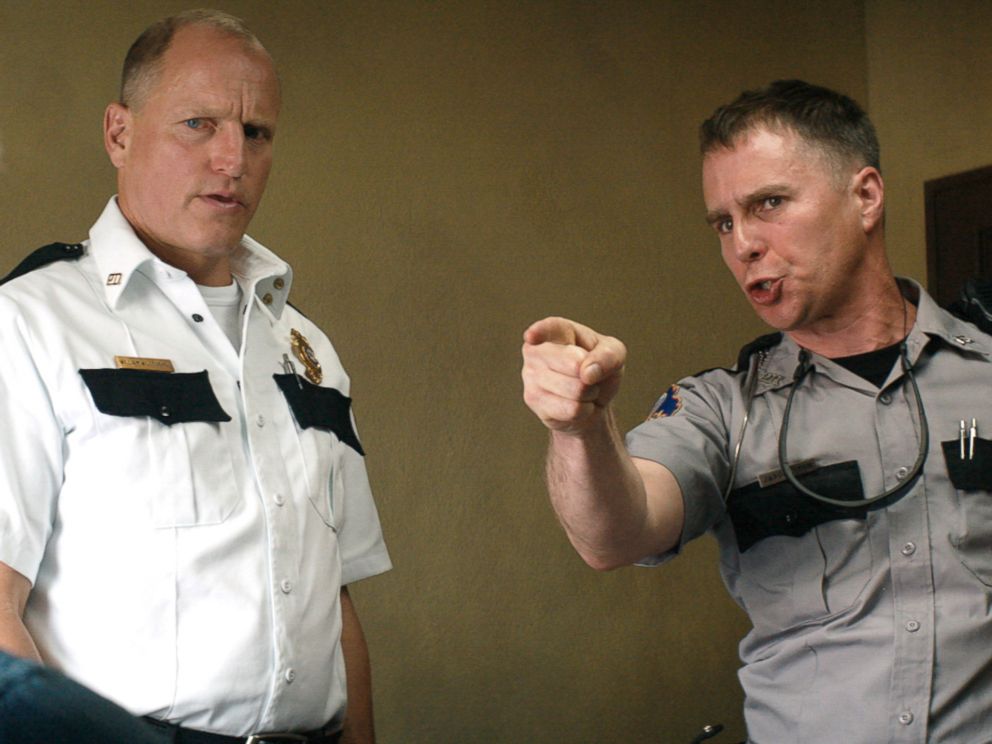
Usually I give you guys formal screenwriting advice. But today I’m going to change things up and give you screenwriting HACKS, flashy tips that aren’t meant to guide you to the perfect screenplay so much as spice your script up. You can use two of them. You can use seven of them. It’s up to you. They will never make nor break your script. But they will HELP. Let’s begin!
1 – A concept you don’t have to defend – I see this all the time. Someone will pitch me an idea like, “A group of people trying to make it in Los Angeles endure a series of obstacles but eventually come out on top.” The writer will then immediately launch into a defense of his logline before I even say anything. “I know that sounds generic. But what it’s really about is this guy who runs an acting workshop and see…” I’m not saying the above idea would make a terrible script. If the writer knows character, it could be great. But we’re talking about hacks here, things to make your job easier. You do this by coming up with a concept that speaks for itself, that isn’t so boring that you have to defend it. “A young African-American man visits his white girlfriend’s creepy parents for the weekend, and begins to suspect that they’ve brought him here to hurt him.”
2 – At least one big character – Big characters jump off the page and get big actors attached. The kind of character you’re generally looking for here is a chatterbox with opinions who’s a little bit crazy. Juno. Ladybird. Walter from The Big Lebowski. Louis from Nightcrawler. Mildred from Three Billboards. Dixon from Three Billboards. This is one of the easiest ways to make your script stand out.
3 – A flashy opening scene – This is a TV pilot staple. But they’re available to you feature writers as well. Give us a scene that grabs us right away. If it doesn’t fit into the timeline of your story, you can make it a flash-forward. Those first 5 pages are when you’re being judged the harshest. It’s when the reader is literally thinking, “I have to read another terrible script before I can get to my own writing??” Give’em a hell of a great scene, like the opening of Scream (one of the most famous spec scripts ever), Inception, or all the James Bond films, and they’ll want to stick around.
4 – Efficient description – Keep your paragraphs to THREE LINES AT MOST. Make most of them TWO LINES AT MOST. If that scares you, good! Scripts are supposed to be easy to read. Not a chore. Learn to be a poet, to say as much as possible in as few words as possible.
5 – A small group of strong characters as opposed to a large group of average characters – Spec scripts work best with a tight cast of characters. Fight it all you want. It doesn’t change the fact that the screenwriting format LOVES setups with 4-5 main characters. Cloverfield 13, Get Out, Ex Machina, Room. All of these superhero movies with 30 characters are not spec scripts and therefore don’t require an overworked reader to keep track of all 30 people. Also, a small group of characters allows you to focus the story and give those characters more attention. So look for ideas that favor this setup.
6 – Dialogue that’s a model, not a mannequin – Mannequin dialogue is the bare essentials. It’s the shape of the human, but there’s no expression or individuality to it yet. A model, on the other hand, has a face that can express emotion. Hair that can be styled. You can dress her in something classy, sassy, slutty, distinguished, whatever you want. Here’s a scene from Three Billboards, where Dixon (Sam Rockwell) is drunk and badgering Mildred at the bar. A patron tells Mildred she sounded great in her TV interview yesterday. Here’s the “mannequin” version of Dixon’s dialogue: “Why are you encouraging her? What she’s doing is wrong.” Note how straightforward and generic that is. Anybody in the world could’ve said it. Now here’s the “model” version, which was used in the movie: “I didn’t think you came across really good in the things you were saying. I thought you came across stupid-ass.” Dixon is an idiot, a 6th grader in a man’s body. We see that here in his butchered grammar and low level vocabulary. This is how you dress up dialogue. You have it express the individual who’s speaking.
7 – An antagonist with personal motivation rather than general motivation – Marvel keeps screwing this up but there are signs of course-correction. Having a bad guy who wants to collect some item so they can harm the world is boring because it’s generic. But a bad guy who has a personal beef with the hero, as we saw with Black Panther, is interesting because it’s specific. If that doesn’t work, consider a personal beef adjacent to your hero. This is what Spider-Man: Homecoming did. The Vulture wanted to hurt the city because they went back on their contract with him, leaving him high and dry in his career and his family. Villains with solid motivations juice a story up.
8 – One giant setup and payoff – You can have as many setups and payoffs as you like. But you need one great one. Setups and payoffs are so fun and audiences LOVE them. Unfortunately, I don’t see as many of them as I used to. The Rita Hayworth poster in The Shawshank Redemption. The snakes in Indy. The clock tower storm in Back to the Future. Where are my current setups and payoffs at?
9 – A twist ending – I hesitate to put this here but nothing affects a reader more than a twist ending they never saw coming. It’s got to make sense for the movie. But there isn’t a single device that can upgrade a script faster than a great twist ending.
10 – At least one scene you KNOW everyone will be talking about when they leave the theater – I can’t tell you how many scripts I read without a SINGLE memorable scene. You need a scene that defines your movie. Achieving this is easier than you think. Just come up with a scene idea that you know audiences will have a strong reaction to. Fish sex for The Shape of Water. The peach scene in Call Me By Your Name. Dixon throwing the advertising agent out the window in Three Billboards.
There ya go. Now go hack at it!




